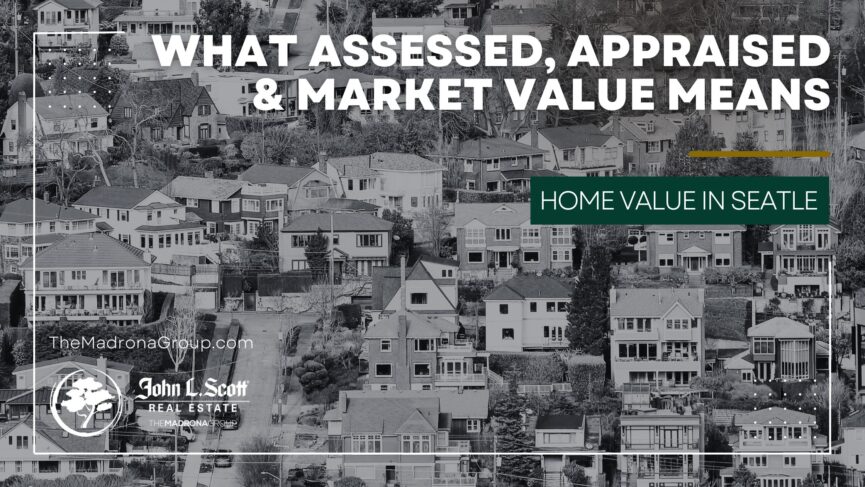In a bustling real estate market, knowing your home value in Seattle, isn’t just a number on a page—it’s the key to making smart financial decisions. Whether you’re looking to sell, refinance, or just keep tabs on your biggest investment, understanding the different types of home values is essential.
Over the past five years, home prices in Seattle have surged by nearly 40%!
That’s a huge jump, and it means that what you thought your home was worth a few years ago could be way off today. Whether you’re thinking of selling or not, keeping an eye on your home’s value is always a good idea—you don’t want to be paying more in taxes than you should or miss out on an opportunity to refinance at a better rate.
When we talk about home value, it’s not just one number we’re talking about. There are three key values you need to understand: assessed value, appraised value, and market value. Each one plays a different role, and they all matter in their own way. Let’s break it down:
- Assessed value: This is the number the county uses to calculate your property taxes. It’s not necessarily what your home would sell for, but it directly affects how much you’ll pay in taxes each year.
- Appraised value: This is what a licensed appraiser says your home is worth, and it’s crucial for getting a mortgage or refinancing. Lenders rely on this value to decide how much they’ll loan you.
- Market value: Simply put, this is what buyers are willing to pay for your home right now. It’s the number you’ll focus on if you’re selling your house.
Understanding the differences between these values is like having a roadmap for navigating Seattle’s dynamic real estate market. You can avoid surprises—like an unexpectedly high property tax bill or a low appraisal that throws off your refinancing plans. More importantly, when you’re ready to buy or sell, you’ll be doing so with a clear sense of how your home fits into the current market.
What Is Assessed Value and How It Impacts Seattle Homeowners?
Let’s start with assessed value. This is the number your local government—like King County—assigns to your property to calculate your taxes. It’s basically the county’s estimate of your home’s worth, but it doesn’t always line up with market value.
Here’s how they figure it out:
- Location: Where your home is located in Seattle makes a big difference. Are you near great schools or in a trendy neighborhood?
- Lot size: The bigger the lot, the higher the assessed value.
- Condition: A home in great condition will have a higher assessed value than one that needs repairs.
Even though the county tries to keep the assessed value up-to-date, it often lags behind what’s actually happening in the real estate market—especially in a fast-moving city like Seattle. Your home might have jumped in value on the market, but the assessed value could still be catching up.
Let’s take a look at an example:
You and a friend both have homes in Seattle—yours in North Seattle and theirs in South Seattle. Both homes are about the same size and were built around the same time. Yet, your assessed value is higher. Why? Because North Seattle is closer to popular schools, parks, and maybe even downtown. These amenities increase demand, which drives up your assessed value—and your property taxes.
But here’s the important part: assessed value is not market value. It’s just what the county uses to calculate taxes, not what your home would sell for. So, if your assessed value goes up, that’s great because it means your property is worth more—but be ready for the flip side: higher property taxes.
And if you think your home’s assessed value is too high? You can appeal it. It’s your money, after all.
Appraised Value: What It Means for Seattle Buyers and Sellers
Now that we’ve covered assessed value, let’s dive into appraised value—the number that really matters when you’re buying, selling, or refinancing your home. Unlike the assessed value, which the county uses for taxes, appraised value is a professional’s estimate of your home’s true worth.
Here’s how it works:
When you’re buying a home, the lender will typically order an appraisal to ensure the home is worth what they’re loaning you. They want to make sure they’re not over-lending for a property. Same goes for refinancing—your lender wants to know how much equity you have before approving the loan.
Appraisers look at a few key things when determining your home’s value:
- Home condition: Is your home move-in ready, or does it need major repairs?
- Upgrades or renovations: A shiny new kitchen or a fresh coat of paint can boost your home’s value.
- Comparable sales (comps): What have similar homes in your neighborhood recently sold for? This helps appraisers figure out what your home is worth in today’s market.
Why does appraised value matter? It can make or break a deal, especially when you’re buying or refinancing. If the appraised value comes in lower than expected, lenders might not approve the full loan amount. But if it comes in higher, you’re in great shape.
Let’s take an example:
You own a home in Capitol Hill. Over the years, you’ve made some significant upgrades—new hardwood floors, a modern kitchen, and fresh paint. When the appraiser comes in, they take all that into account and appraise your home higher than expected. That’s good news for you, especially if you’re looking to refinance—you might qualify for a better rate or even be able to borrow more.
But remember, appraised value is just one piece of the puzzle. It’s more precise than assessed value, but it still may not match up with what buyers are willing to pay in the current market.
What Is Market Value and How Seattle’s Hot Real Estate Market Influences It
Now let’s talk about market value, also known as comparable market value. This is the number that matters most when you’re buying or selling a home. In simple terms, market value is what buyers are willing to pay for your home right now.
Market value is determined by:
- Current demand: Is the Seattle market in a frenzy with buyers competing for limited homes, or has demand cooled?
- Local economy: What’s happening with Seattle’s tech companies and other major employers? An influx of high-paying jobs can push home prices up.
- Comparable sales: What have similar homes in your neighborhood recently sold for? This sets the expectations for both buyers and sellers.
Here’s the thing:
Seattle’s market is hot. We’ve seen homes selling well above asking price, thanks to bidding wars and limited inventory. This is especially true in neighborhoods like West Seattle and Capitol Hill, where demand is high. In these areas, market value can easily soar beyond assessed or appraised values.
Take, for example, a cozy three-bedroom in West Seattle. You list it for what seems like a reasonable price, based on recent sales. But the market has shifted—low inventory and high demand drive buyers into a bidding war. Suddenly, they’re offering thousands over your asking price. That’s market value in action.
But here’s the kicker: market value can change quickly. In one month, prices might be climbing, and the next, they could level off or even drop, depending on broader economic conditions, interest rates, or national housing trends. This is why keeping tabs on Seattle’s market trends is essential, whether you’re thinking of selling soon or just keeping an eye on your investment.
Why Home Values Vary in Different Seattle Neighborhoods
Seattle is a city made up of distinct neighborhoods, and home values vary widely depending on where you are. Location is everything when it comes to real estate values, and Seattle’s neighborhoods are no exception.
Here are a few factors that contribute to home value differences across Seattle:
- Proximity to downtown: Homes in neighborhoods like Queen Anne or Magnolia tend to have higher values because they’re closer to the heart of the city and offer stunning views.
- Schools: Families are willing to pay a premium for homes in neighborhoods with top-rated schools, like Ballard or Ravenna.
- Parks and walkability: Areas like Green Lake or Laurelhurst with access to parks and outdoor activities tend to see higher demand.
- Transportation: As Seattle’s traffic gets worse, homes near light rail stations or major highways are becoming more desirable. Neighborhoods like Rainier Valley, where light rail expansion has made commuting easier, are experiencing rising home values.
For example, homes in Queen Anne or Ballard usually come with a higher price tag. Why? Because they’re close to downtown, have great schools, and offer easy access to parks and trendy restaurants. On the other hand, Rainier Valley may have had lower values in the past, but thanks to new developments and improved transit options, it’s a neighborhood on the rise.
Key takeaway: Neighborhood dynamics—whether it’s schools, parks, or proximity to public transit—play a huge role in determining home values in Seattle. Understanding how these factors affect different neighborhoods helps you get a clearer picture of where your home stands.
How to Use These Home Values to Your Advantage in Seattle
Now that we’ve covered the differences between assessed, appraised, and market value, let’s talk about how you can use this information to your advantage.
Assessed Value: Keep an Eye on Your Taxes
Your assessed value determines your property taxes, so it’s worth monitoring. If your assessed value seems too high, you can appeal it and potentially save hundreds or even thousands of dollars in taxes.
Appraised Value: Maximize Your Refinance Options
A higher appraised value can give you more financial flexibility when refinancing. If your home has appreciated or you’ve made improvements, a strong appraisal can help you get better loan terms or tap into your home’s equity.
Market Value: Sell for Top Dollar
When you’re selling your home, market value is the most important number. Understanding what buyers are willing to pay helps you set the right price and maximize your profit. In a hot market like Seattle, pricing your home strategically could lead to multiple offers and a final sale price that’s even higher than expected.
Conclusion: Get the Most Out of Your Home Value in Seattle
To wrap it all up, understanding assessed, appraised, and market value is crucial whether you’re buying, selling, or just trying to keep your property taxes in check. Here’s a quick recap:
- Assessed value is used for property taxes, and you can appeal it if it seems too high.
- Appraised value is what a licensed appraiser thinks your home is worth and plays a big role when buying or refinancing.
- Market value is what buyers are willing to pay in the current market, and it’s the key number when selling.
Being informed about your home’s value means you can make smarter decisions and get the most out of your biggest investment in Seattle’s ever-changing real estate landscape.
Curious about your home’s current market value in Seattle? Contact us today for a free home evaluation, or let us help you navigate the city’s dynamic real estate market. Whether you’re selling or just keeping an eye on your home’s worth, we’ve got you covered!
Share this post!




